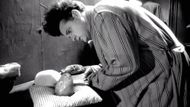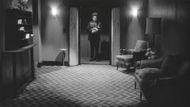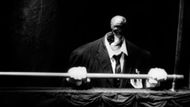David Lynch's Eraserhead (1977) is a surrealist movie that is largely impossible to grasp as a whole. However, the overarching theme is the deep fear of fatherhood. The movie depicts Henry Spencer's psychological distress, a guy who feels he has the responsibility of being a dad.
Spencer is a quiet man who lives in a dark, industrial town. He is the father of a very sick and deformed baby. When the baby's constant crying and illness become too much to bear, Henry's girlfriend Mary leaves, and he is left to care for the child by himself.
As time passes, the pressures of fatherhood and isolation start to reach Henry's brain. The baby continuously cries, is fully wrapped in bandages, and eventually develops painful sores.
Henry starts to experience nasty and creepy hallucinations.
One of the most remembered is of a woman called the Lady in the Radiator, singing, "In Heaven, everything is fine" while she walks over small worm-like creatures. In yet another bizarre sequence, Henry's head is removed and exchanged with the baby's head, and his real head is taken off to a factory where it is transformed into pencil erasers.
All these bizarre sequences demonstrate how much Henry is breaking down mentally.
The movie ends on a dark climax when Henry, driven by desperation and horror, kills the baby. This initiates a last series of surreal and symbolic shots, leaving the story to the viewer's imagination.
Fundamental fears of fatherhood, isolation, and terror within a dreamlike and involuntary hellworld are the prime concerns Eraserhead addresses.
Henry's nightmare in Eraserhead: Fear of fatherhood

At its core, Eraserhead is about the intense fear of fatherhood. Henry Spencer's bizarre, inhuman infant—constantly wailing, swaddled in bandages, and slowly disintegrating—is a manifestation of the anxieties that David Lynch experienced in life.
The infant is a metaphor for the anxiety and powerlessness that can accompany parenthood. Its incessant crying is symbolic of the demanding duty of being a parent. The illness and ultimate collapse of the baby mirror Henry's terror of not being able to take care of his child.
Some critics argue that the baby's design, being sperm-like, indicates guilt about conception and thus makes fatherhood appear to be a trap. Henry's savage attack on the baby during the climax indicates fear of perpetuating cycles of violence through generations.
Moreover, Lady in the Radiator sings to Henry that "everything is fine in heaven," symbolizing Henry's wish to flee the cruel grip of fatherhood.
Her stomping on sperm-like creatures implies a repudiation of reproduction, casting parenthood as a trap.
Industrial setting and social alienation

The film's location—a desolate, industrial landscape—corresponds with Henry's psychological collapse. The chilly, mechanistic sounds and the dead air evoke the emotional hollowness Henry experiences.
As The Film Connoisseur notes:
"This is a city without trees, without beautiful looking anythings, this city that Henry lives in and walks through every day from and to his job is one industrial nightmare. It seems post apocalyptic, abandoned, an utterly sad place to live in."
All this actually mirrors Henry’s own sense of despair and alienation.
Eraserhead also documents the disorientation and apprehension many men experienced in America during the 1970s. The movie was released in a period of great social transformation.
The women's liberation movement and the sexual revolution were overturning traditional male and female roles. At this point in history, most women were entering the workplace, struggling to be treated as equals, and working towards a new definition of their roles in society.
These new developments left some men uncertain about their role and function. President Jimmy Carter even characterized the nation as facing a "crisis of confidence."
Historian Beth L. Bailey explained that with every advance women made toward equality, “further stressed the average American male and his image of himself as a man.”
In Eraserhead, Henry is the ordinary man who gets caught up in this crisis. He is introverted, nervous, and insecure. He has a mundane office job, has a dingy apartment, and becomes a father without being prepared for it.
He does not assert himself or resist when people push him around, not even when Mary, the mother of the baby, abandons him to tend to their unsettling, ill child.
Henry's weakness and lack of action reveal anxiety on the part of some men that they were going to lose control both in work life and home life.
When Mary goes, it mirrors concerns over role reversals within the home, particularly that men were being expected to become involved in childcare and domestic tasks once viewed as so-called wifely duties.
Existential and spiritual dimensions in Eraserhead

Eraserhead is heavily influenced by existential philosophy, particularly the writings of philosophers such as Jean-Paul Sartre and Albert Camus.
The protagonist navigates a bizarre, surreal world inhabited by grotesque creatures and nightmarish landscapes. His odyssey symbolizes humanity's quest for meaning, freedom, and purpose in a frequently meaningless universe.
As one article in The Catholic World Report states, the movie has a sense of being lost in:
“an utterly foreign field of dark forces with no meaning or purpose, overwhelming the subject and filling him with dread.”
Lynch intentionally crafted the narrative to be otherworldly and inexplicable. He wanted viewers to feel uncertain and uncomfortable, just the way people feel when they realize that life is not always logical.
This is very much in line with Camus's concept of "the absurd": the belief that humans cry out for life to be meaningful, but the world offers no apparent answers.
Henry is passive at the start of the film. He allows others to decide for him and feels trapped in his circumstances, particularly by the unexpected burden of fatherhood.
But existentialism instructs that fear can awaken us and make us aware that we are free to choose our own path. In Eraserhead, Henry gradually confronts his fears, and the movie concludes with a powerful and unsettling scene in which he confronts the nightmare he's been living.
Lynch has famously stated:
“I don’t think that people accept the fact that life doesn’t make sense. I think it makes people terribly uncomfortable.”
This belief informs the entire film. In one of his interviews, he referred to Eraserhead as his "most spiritual film."
A few authors have noted that the film also draws concepts from Gnosticism, a faith that views the material world as corrupt and dark. Gnostics tend to look at the body, reproduction, and sex as snares that trap the soul in an imperfect material universe.
Eraserhead mirrors this perspective in its sickening images of bodies, meat, and the deformed baby, implying that true freedom can only be achieved through spiritual awareness or greater understanding.
Lynch never supplies a definitive explication of what the movie's about, and that's part of the message. No easy answers are offered, just as life itself rarely offers them.
Eraserhead forces the observer to venture out into horror, confusion, and mystery and seek meaning therein themselves.
Lynch's personal life and fears
David Lynch's own life had a significant impact on Eraserhead.
During the five years he spent making the film, he was also raising his daughter, Jennifer. She had a congenital medical condition that necessitated numerous operations. It was this testing experience that influenced the central theme of the movie: anxiety and the pressure of fatherhood.
The bizarre, perpetually wailing infant in the movie is a representation of Lynch's own concerns regarding the challenges and uncertainties of parenthood.
Love movies? Try our Box Office Game and Movie Grid Game to test your film knowledge and have some fun!
